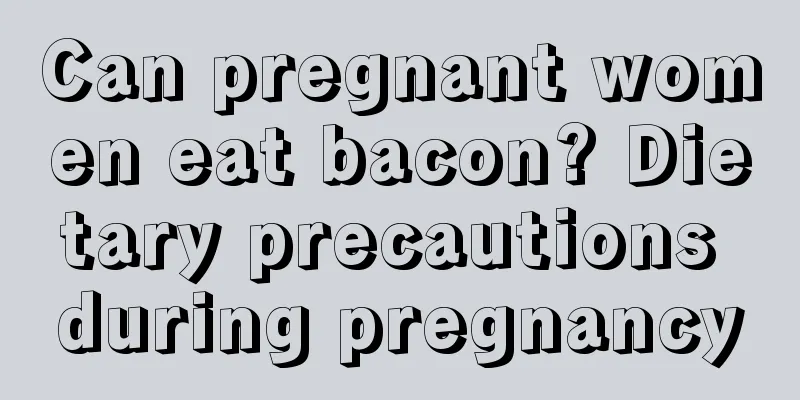Can pregnant women eat bacon? Dietary precautions during pregnancy

|
Bacon is a very traditional food in our country. Many people like to eat bacon. Bacon is a pickled food. Eating too much is not good for our health, especially for pregnant women. Can pregnant women eat bacon?Eat less, eat carefully, or better yet, don’t eat. The specific reasons are: 1. Bacon contains carcinogens or may cause fetal malformations Bacon is a pickled food that contains a large amount of nitrite, which is an important carcinogen. If pregnant women eat it, it may be harmful to the fetus, causing fetal development problems or even deformities. Try not to eat it. 2. Bacon is high in fat and cholesterol, which is harmful to pregnant women and fetuses The fat content of bacon is very high. The fat content in 100 grams of bacon is as high as 50%. Moreover, bacon is rich in cholesterol, with 123 mg of cholesterol per 100 grams, which is 50% higher than pork. Saturated fat and cholesterol are the "risk factors" that lead to high blood lipids. It is definitely inappropriate for pregnant women to eat such high-fat and high-cholesterol foods during pregnancy, which is not good for pregnant women and fetal development. In addition to pregnant women, ordinary people should not eat too much bacon to avoid obesity caused by eating too much bacon. 3. Bacon is not conducive to the absorption of nutrients by pregnant women Bacon loses a lot of nutrients. During the production process, many vitamins and trace elements in the meat are almost lost, such as vitamin B1, vitamin B2, niacin, vitamin C, etc. The content is zero. It can be said that bacon is a "double nutritional imbalance" food. It is not nutritious for pregnant women to eat this kind of food. Pregnant women should pay attention to comprehensive nutrition and reasonable combination in their diet to avoid malnutrition or excess. It is recommended to choose high-quality, high-nutrition, less greasy, and easy to digest and absorb fresh food. After a series of processes, bacon and sausage are pickled and basically do not contain vitamins and other nutrients, and the nutritional value is not high. Pregnant women should not eat it. Dietary considerations during pregnancy1. Don’t eat these seafood no matter how greedy you are! Do not eat raw fish and shellfish. For example, sushi, sashimi, oysters, scallops, clams, etc. Do not eat frozen or uncooked seafood. For example, pickled, smoked, and air-dried seafood, but smoked fish can be eaten after secondary baking or cooking. What is cooked? The internal temperature should reach 63 degrees Celsius when cooking fish. Cooked fish means that the fish meat can be separated into thin slices and the whole body is opaque. Shrimp, lobster, and scallops should be cooked until the meat is milky white. Clams, mussels, and oysters should be cooked until the shells open. Those that do not open should be thrown away and cannot be eaten. In addition, fish with high mercury content such as swordfish, shark, mackerel, mackerel, and tilefish are best not to be eaten by pregnant women. Excessive intake of mercury can damage the baby's developing nervous system. You can choose fish with low mercury content, such as shrimp, salmon, cod, catfish, anchovies, and salmon. (It is recommended that pregnant mothers can eat 230-280 grams of seafood per week) 2. Meat + poultry + eggs must be fully cooked! The risk of food poisoning increases during pregnancy, and your reaction will be more severe than when you are not pregnant. Food poisoning can also affect the baby in your belly. Make sure meat and poultry are fully cooked. Hot dogs and luncheon meats should be boiled before eating. Avoid eating refrigerated meat products directly. But canned or aseptically packaged ones are OK. When boiling eggs, make sure the egg whites and yolks are coagulated. Change your habit of eating soft-boiled eggs. Don't eat some expensive eggs marked as edible raw, or Japanese food with raw eggs mixed with rice... 3. When choosing dairy products, check the pasteurization label. There are many low-fat dairy products, such as skim milk, mozzarella, and farmer's cheese, that are good dairy products, but any unpasteurized dairy product is not safe. Avoid soft cheeses such as Brie, feta, and blue cheese unless they are labeled pasteurized or made from pasteurized milk, and avoid unpasteurized juices. 4. Wash fruits and vegetables thoroughly Fruits and vegetables should be washed thoroughly before consumption to remove harmful bacteria. Do not eat any raw sprout foods (such as bean sprouts, radish sprouts) because they may contain pathogenic bacteria and must be cooked thoroughly before eating. 5. You really can’t drink too much coffee Caffeine can cross the placenta and affect the fetal heart rate. Many studies have mentioned that excessive caffeine intake is associated with an increased risk of miscarriage. Doctors recommend that pregnant women consume no more than 200 mg of caffeine a day. For reference: a cup of brewed coffee (237 ml) contains about 95 mg of caffeine, a cup of tea (237 ml) contains about 47 mg of caffeine, and a can of cola (355 ml) contains about 33 mg of caffeine. By the way, online celebrity milk teas are often found to contain excessive caffeine. 6. Drinking during pregnancy is no joke A rare drink is unlikely to cause harm to the fetus, but any alcoholic beverage is unsafe for pregnant women. The safest option is to stay away from alcohol completely during pregnancy. Think about the risks of drinking: drinking during pregnancy increases the risk of miscarriage and stillbirth, and excessive alcohol intake can also cause many serious complications, such as facial deformities, heart maldevelopment, and mental development delays in the baby. Even moderate drinking may affect the brain development of the fetus. If you drank before you found out you were pregnant, don't guess and communicate with your doctor. When you are pregnant, there are indeed many foods that can affect the health of you and your baby, perhaps more than you think. Pay more attention to what is mentioned in the article. Don't eat what you shouldn't eat, and eat whatever you like for the rest, and don't be too nervous. A balanced diet is important for pregnant mothers and fetuses. What pregnant women eat will cause fetal deformity1. Fattening pig liver Pork liver is good for pregnant women, and can prevent and treat anemia during pregnancy. However, many pork livers are now used to promote fattening, and the vitamin A content in the livers will rise rapidly. Pregnant women are prepared to eat more pork livers to replenish their blood, but eating this kind of pork liver will damage various systems of the human body, such as the central nervous system, liver, urinary system, skin, blood and bones, and may even cause fetal malformations. Therefore, it is better for pregnant women to eat less pork liver. 2. Long-stored potatoes Many friends know that potatoes that have been stored for a long time cannot be eaten, especially potatoes that have sprouted. Ordinary people who eat such potatoes may suffer from abdominal discomfort and diarrhea at the mildest, or even poisoning and need to be hospitalized. It is even more harmful for pregnant women to eat such food, because the immunity of the fetus in the abdomen is very low, and the development of the fetus will be greatly hindered, and in severe cases, the fetus may be deformed. 3. Strongly acidic foods If pregnant women eat foods with strong acidity, such as meat, chocolate, and sugar, the level of catecholamines in the mother's blood will increase greatly. Excessive levels of this substance can easily cause the mother to become irritable and restless, which can easily affect the fetus. In addition, excessive levels of this substance can easily increase the secretion of toxic substances and cause fetal malformations. 4. Seven types of seafood are likely to cause deformities We all know that if the mercury content in food exceeds the standard, pregnant mothers are prone to mercury poisoning and teratogenic reactions after eating. Environmental groups in the United States have found that the mercury content of seven kinds of seafood is far beyond the range of human tolerance. These seven kinds of seafood are: tuna, Gulf of Mexico oysters, sea bass, halibut cod, marlin, pike and whitemouth. In other words, pregnant mothers should avoid these kinds of fish in their daily diet. 5. Foods containing Toxoplasma gondii Almost all mammals and birds (such as rodents, pigs, sheep, cattle, rabbits, chickens, ducks, geese, etc.) can be infected with Toxoplasma gondii, which can be transmitted to the fetus through the placenta, causing congenital infection of the fetus. It can cause miscarriage, premature birth, and stillbirth. Among the infected infants, neural tube defects are the most common: the baby will show microcephaly, hydrocephalus, epileptic seizures after birth, resulting in mental retardation, etc. Some newborns have no special signs at birth, only low weight, anemia, jaundice, etc., but gradually develop convulsions, meningitis, brain calcification, and about one-third of infected infants will develop chorioretinitis and blindness. Therefore, pregnant women must be cautious when eating these foods, cook them at high temperature, and it is best not to eat some less commonly eaten meats, such as rat meat, rabbit meat, dog meat, snake meat, etc. 6. Contaminated food Food safety is a very big problem in today's society. There are all kinds of fraud, pesticides, etc. Some people can do anything to make the food look good. If a pregnant mother eats fish from polluted waters and vegetables and fruits covered with pesticides, the risk of fetal malformation will be greatly increased. Precautions for pregnant women to eat bacon and sausageIf you really want to eat it, you can try a little bit. However, the best way for pregnant women to eat bacon and sausage is to boil it in water, add more water, and cook it for no less than 30 minutes each time. This will allow some nitrite to dissolve in the water. In addition, eat more fruits, foods rich in vitamin C, vitamin E, etc., which have antioxidant effects and can resist the absorption of nitrite to a certain extent. In addition, it is also important to try to choose high-quality sausages that meet production standards. |
<<: Is it dangerous to have low blood pressure during childbirth?
>>: What supplements should women take after miscarriage to help their bodies recover quickly?
Recommend
What foods are best for gestational diabetes? Can gestational diabetes eat blueberries?
Gestational diabetes is a relatively dangerous di...
How to prevent baby from getting cavities? Don’t let your child eat adults’ saliva
It is very common for children to have cavities, ...
How is Bimbosan milk powder? The milk source is of very high quality
For every 10 cans of milk powder sold in Switzerl...
Can I open the windows during the dog days of summer? Can I open the windows during the summer?
The most taboo thing during confinement is blowin...
How can I get my milk back if I get angry and my milk is not coming back? Can I get my milk back if I get angry and my milk is not coming back?
Postpartum mothers are prone to mood swings due t...
How many grams does one spoon of Abbott milk powder weigh? How to prepare Abbott milk powder?
Different milk powders have different scoops of g...
Can I still get pregnant if I have cervical erosion?
Cervical erosion is a common female disease. Wome...
At what age can a baby eat by himself? How to make a baby love eating?
Learning to eat by yourself is a stage that your ...
Is it harmful to swallow mouthwash? How to use mouthwash correctly
You don't need to rinse your mouth with water...
Does the painless delivery injection have any side effects? The pros and cons of the painless delivery injection
With the development of medical technology, the w...
Will children with calcium deficiency cause teeth grinding? Will children with calcium deficiency cause convulsions?
Many mothers know that if a child is calcium defi...
Girls' names from Tang poetry Recommended nice girl names from Tang poetry
Tang poetry and Song lyrics are beautiful texts t...
Can I get an induced labor certificate for prenatal depression? Can I have an early caesarean section for prenatal depression?
It is a relatively dangerous situation for pregna...
What are the methods for removing phlegm from infants and young children? Four methods are recommended
Many infants and young children have phlegm in th...
Can Dettol disinfectant be used to wash underwear? Can Dettol disinfectant be used to wash baby clothes?
Dettol disinfectant can be used for washing cloth...









